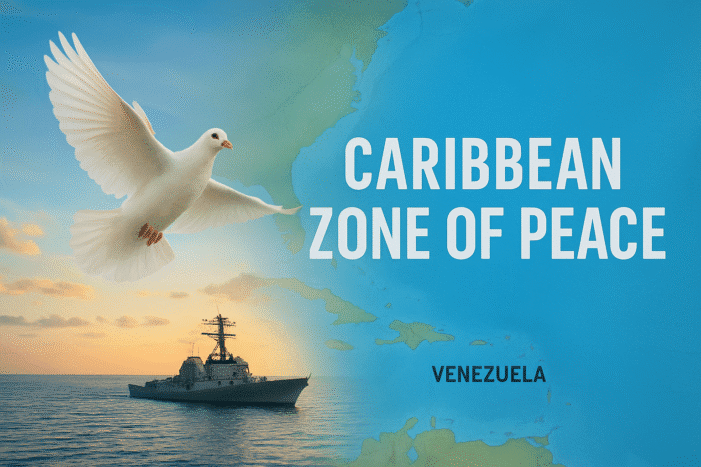Region’s commitment to peaceful coexistence under pressure amid U.S. strikes off Venezuela
By Janet Howard, CAW Exclusive
The Caribbean is rapidly becoming a flashpoint of military activity, as the United Nations and regional governments raise alarms about recent U.S. strikes that they say undermine the region’s long‑held status as a “Zone of Peace.” Meanwhile, the Community of Latin American and Caribbean States (CELAC) and individual Caribbean nations are calling for respect of sovereignty, non‑intervention and adherence to international law.
The “Zone of Peace” in Theory
Since the mid‑2010s, many Latin American and Caribbean states have invoked the principle of the region as a Zone of Peace — a collective commitment to avoid external military intervention, respect sovereignty, and pursue conflicts through dialogue rather than force.
In September 2025, regional foreign ministers meeting under CELAC reaffirmed that the Caribbean should remain “a land of peace, free from any intervention and in strict adherence to United Nations declarations and to the preservation of peace and sovereignty.” Yet the concept has come under increasing strain. As the Prime Minister of Trinidad and Tobago put it bluntly:
“The notion that the Caribbean is a Zone of Peace has become a false ideal. The reality is stark – no such peace exists today.”
U.S. Military Strikes Off Venezuela’s Coast
Multiple lethal strikes by the United States in the southern Caribbean — just off the coast of Venezuela — have triggered immediate concern and condemnation.
– On October 14, 2025, the U.S. announced a strike on a small vessel near Venezuela, killing six people whom officials labelled “narcoterrorists.”
– On October 3, another boat was struck, reportedly killing four aboard. The U.S. defense secretary said the vessel was affiliated with a designated terrorist organization.
– Earlier, on September 2, a strike killed 11 people and was described as the first of its kind publicly acknowledged by the U.S. in the region.
– A further incident in mid‑October produced survivors, prompting questions about how U.S. forces will treat them legally and whether they are being held as detainees.
According to U.S. statements, these operations form part of an intensified “war” on drug trafficking — especially vessels alleged to be transiting from Venezuela to the U.S. market.
Clash of Narratives and Legal Questions
U.S. Position: The White House frames the strikes as lawful operations under the Commander‑in‑Chief’s authority, targeting narcotics networks designated as terrorist organizations.
Regional Response: Venezuela’s government denounces the attacks as “extrajudicial executions” and violations of sovereignty. The UN has raised alarm, and Caribbean states have voiced concerns that the “Zone of Peace” principle is being ignored.
Legal uncertainties: Observers question whether a strike on a drug‑trafficking vessel in international waters can be justified as an “armed attack” under international law, and whether the victims should be afforded protections.
Broader implications: Middle‑power Caribbean states worry about being drawn into an escalated U.S.‑Venezuela confrontation. Fishing and coastal communities near the strike zones report disruptions and fear for their safety.
What’s at Stake for the Caribbean
– Sovereignty & regional identity: The Caribbean has striven to define itself as a region of peace, non‑intervention and collective self‑determination.
– Stability & security: While the U.S. argues the strikes are aimed at drug‑trafficking, regional states worry about the precedent — military action in their sea‑space without multilateral oversight.
– Rule of law & human rights: Without transparent evidence or clear legal frameworks, the risk of perceived extrajudicial killings or mis‑targeting looms large.
– Diplomatic dynamics: Relations between U.S., Venezuela, Colombia and Caribbean states are being tested — especially as some Caribbean governments must balance solidarity with regional partners and cooperation with the U.S.
Outlook: A Tenuous Peace in the Caribbean
Unless coordinated dialogue and legal clarity are introduced, the Caribbean’s “Zone of Peace” could appear increasingly aspirational rather than real. The U.S. might argue urgency in counter‑narcotics operations, but regional actors say the means should not compromise the ends — peaceful coexistence and respect for sovereignty.
As one Caribbean diplomat put it: “What we must avoid is the Caribbean turning into a battlefield because one state treats its neighbors’ waters as a war zone.”
For now, the region watches closely — hoping that the next move is toward diplomacy, not deeper confrontation.


